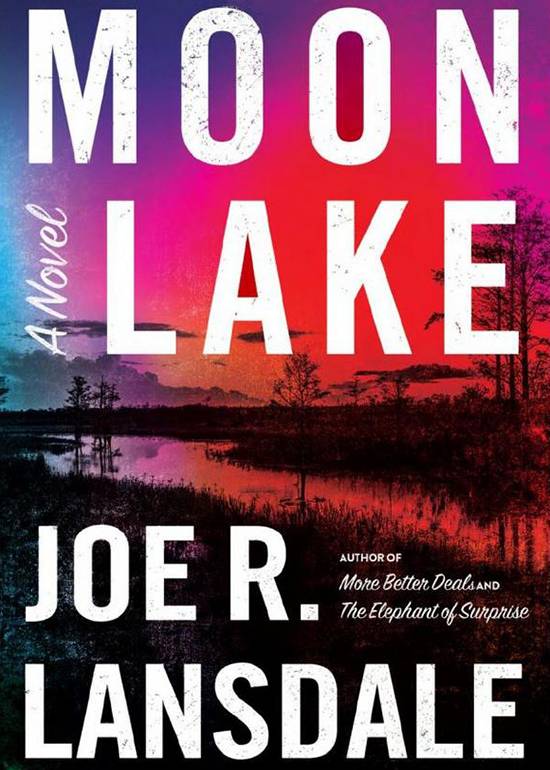Dark Night

Moon Lake: A Novel
by Joe R. Lansdale
New York: Mulholland Books, 2021.
337 pp. $28.00 hardcover.
Reviewed by
William Jensen
Joe R. Lansdale is a beast. Not only is he a prolific writer of horror, mystery, western, and crime, but he consistently turns out quality work. Lucky for us, he is still going strong. Lately Mr. Lansdale has been dedicated to his popular series of books featuring odd couple Hap Collins and Leonard Pine. These mysteries have sold countless copies and became the basis for a well-received television show. Of course, Lansdale still writes and publishes work outside of his most famous duo, and now his newest novel, Moon Lake, tackles racism, political corruption, and good old-fashioned murder. It is a triumph of suspense in the tradition of the great noir and pulp writers of the ’30s and ’40s.
Throughout Moon Lake, Lansdale weaves mystery and coming-of-age and rural gossip with humor and thrills. The book starts with a power-punch to the chest as narrator Daniel Russell recounts how his father tried to kill them both by crashing their car into the titular Moon Lake. This starts in 1968 when Daniel is thirteen. This first section is nearly perfect. The fear and angst are so honest and real, one could easily imagine this being truth—more than a confession or a memoir, but something too haunting to be fiction. Though Lansdale is famous for his humor, he also handles his violence expertly. Describing the watery crash, Lansdale writes:
“When the car struck the water, I took a deep breath. There was a slapping sound as it hit. The headlights flowed briefly, even underwater, but only for a moment, then they snapped off. The windshield caved in, folded like a blanket, and banged up against me. Cold water and the impact of the windshield washed me loose of my seat and towed me away.”
And that is just the last paragraph of the first chapter. The opening section, titled “The Night, The Bridge, The Pale Moonlight” is my favorite and could stand as a novella on its own. Though Daniel survives the crash (obviously) his adventure is just beginning, and he quickly finds himself facing challenges regarding finding his mother, living with a surrogate family, and eventually moving in with a Dickensian type of aunt. The relationships are multi-dimensional, and Lansdale keeps the tension regarding the incident at Moon Lake taut.
Part Two, titled “The Roar of the Flies” fast forwards ten years, and from here on the book switches gears. Daniel finds himself returning to Moon Lake and the surrounding area where he encounters new dangers, romance, and a lot of dead bodies. The book’s title page calls Moon Lake an “East Texas Gothic,” and I think that’s a false label. Lansdale’s books delve into some terrifying material at times, but Moon Lake is more akin to Raymond Chandler than Shirley Jackson. Some plot points and twists are Chandler to the bone. Interestingly, there is a Mrs. Chandler in the novel, which might be a nod. Like Philip Marlow before him, Daniel has confidants and enemies, and he follows small crimes to larger ones and their cover-ups. People with power and money try to stymie him, and Daniel endures some beatings and uncovers other wrongs. Lansdale knows life is marked with pain, but his characters are smart and tend to have a sly wit. And as a narrator, Daniel Russell has a lot of funny quips and observations. Lines such as “His clothes hung on him as if they were draped over the back of a chair” are brilliant and plentiful.
In some ways Moon Lake is reminiscent of a Hap and Leonard novel… but without Leonard. Daniel’s attitude and voice are similar to Hap’s, and this will delight fans of the series, but some might find the familiarity distracting. As the mystery unfolds with various revelations and discoveries, Moon Lake becomes a noirish criticism of East Texas’s socioeconomics. This is what always separates Lansdale from the rest of the thriller pack. Lansdale owns East Texas the way James Ellroy owns Los Angeles. Both writers not only know the land, the architecture, the rhythms of people’s speech, but they understand how history has shaped the region and its residents. And both writers use a guise of genre to call out the ugly past with all its warts, stains, and tattoos.
I enjoyed Moon Lake, but I also found myself wanting more about Daniel’s childhood. The novel’s first section is the part that stayed with me the most. It is fascinating that, not to give too much away, that Lansdale closes the book the same way it begins. Moon Lake is genuine Lansdale and will please his fans, and it serves as a nice introduction to those yet unfamiliar with the man or his works.
William Jensen is the editor of Texas Books in Review. He is the author of the novel Cities of Men, and his short fiction has appeared in The Texas Review, Tinge Magazine, North Dakota Quarterly, and elsewhere.
